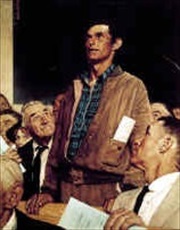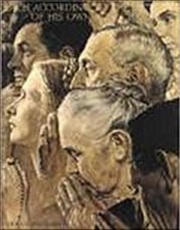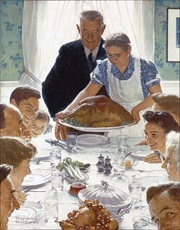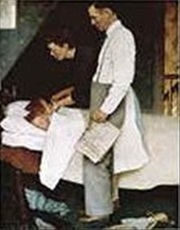FDR PUSHES FOUR FREEDOMS, LEND-LEASE ON NATION
Washington, D. C. · January 6, 1941
On this date in 1941 in Washington, D.C, President Franklin D. Roosevelt used his State of the Union Address to the U.S. Congress to outline his desire for a world based not on a “new order of tyranny”—an allusion to the “new European order” championed by Adolf Hitler’s Germany and Benito Mussolini’s Italy—but on 4 essential human rights: freedom of speech, freedom of worship, freedom from want, and freedom from fear. These 4 freedoms would later be spelled out in the Atlantic Charter, signed by Roosevelt and British Prime Minister Winston Churchill at the Placentia Bay Conference held in Newfoundland, Canada, on August 14, 1941, nearly 2 years after Britain had declared war on Germany and less than four months before the U.S. entered the conflict. (In 1948 the 4 freedoms were explicitly incorporated into the preamble to the United Nations Universal Declaration of Human Rights.) The illustrator Norman Rockwell created a quartet of paintings depicting these 4 freedoms that was first published in the Saturday Evening Post. In 1943 the Office of War Information printed 240,000 copies of Rockwell’s Four Freedoms to be used as an incentive for war bond purchasers.
Roosevelt’s January 6, 1941, address to Congress also signaled a break with the U.S. policy of nonintervention in world affairs by initiating a national debate on what would become the U.S. Lend-Lease program. The president noted that the nations now at war with Nazi Germany, Fascist Italy, and Imperial Japan were growing short of resources and the ability to pay for them. Two months later, on March 11, Roosevelt signed the hallmark legislation that precipitated a flow of military and economic aid to countries whose defense the president deemed vital to the United States, and he established an Office of Lend-Lease Administration that remained active throughout the war. The initial authorization totaled 7 billion wartime dollars and was directed first to the hard-pressed British people. Prime Minister Churchill expressed his country’s appreciation of the measure, hailing it as a “new Magna Charta.” By the end of the war, the U.S. had extended 50 billion dollars in aid (equivalent to $876,844,444,444 in 2024) to all powers fighting the enemy.
Norman Rockwell’s Four Freedoms, Oil on Canvas, 1943
 |  |
 |  |
Top Row (L–R): Freedom of Speech, Freedom of Worship
Bottom Row (L–R): Freedom from Want, Freedom from Fear
Listen to President Roosevelt’s Four Freedoms Speech
Roosevelt Proposes the Lend-Lease Program to the U.S. Congress, Urging Americans to Become the “Arsenal of Democracy”
![]()

 History buffs, there is good news! The Daily Chronicles of World War II is now available as an ebook for $4.99 on Amazon.com. Containing a year’s worth of dated entries from this website, the ebook brings the story of this tumultuous era to life in a compelling, authoritative, and succinct manner. Featuring inventive navigation aids, the ebook enables readers to instantly move forward or backward by month and date to different dated entries. Simple and elegant! Click
History buffs, there is good news! The Daily Chronicles of World War II is now available as an ebook for $4.99 on Amazon.com. Containing a year’s worth of dated entries from this website, the ebook brings the story of this tumultuous era to life in a compelling, authoritative, and succinct manner. Featuring inventive navigation aids, the ebook enables readers to instantly move forward or backward by month and date to different dated entries. Simple and elegant! Click 











